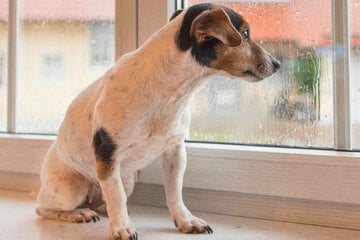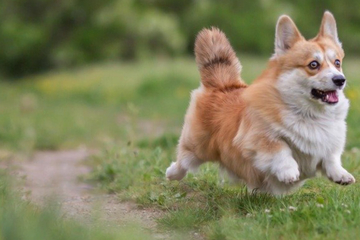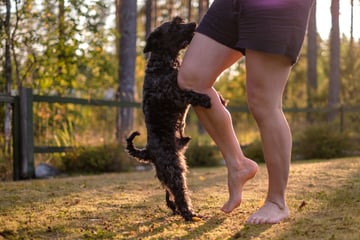Why do dogs pant? Heres how to calm a heavily breathing pup
We've all had that moment of confusion when we wonder, "Why the heck is my doggo panting so heavily?" Try not to worry: here's why dogs pant and what you can do about it.
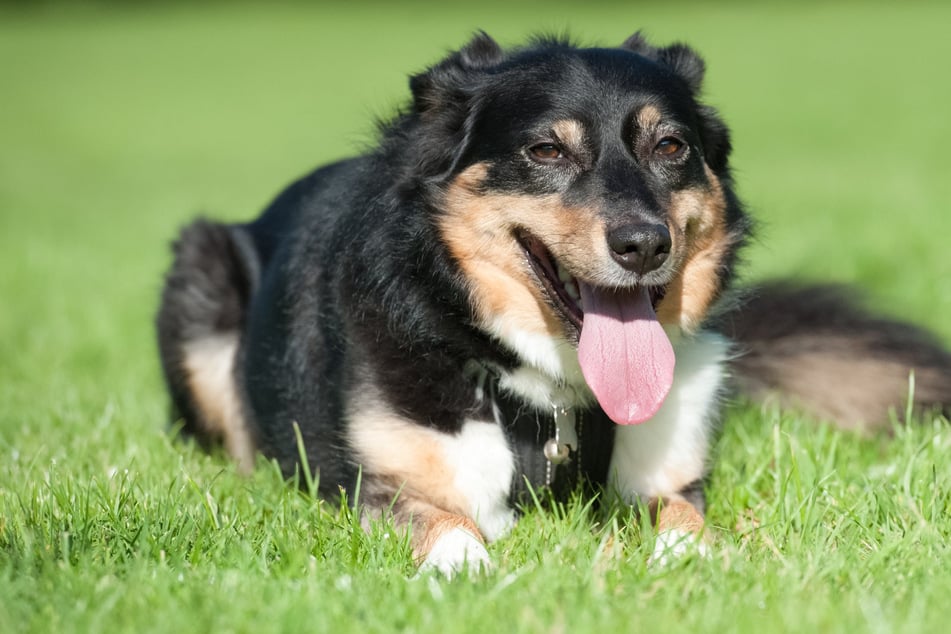
Panting might be a totally normal thing for your dog to be doing, but we won't judge if you get concerned about it from time to time. These fluffy monsters can pant pretty intensely, and it can seem alarming.
Keep in mind, though, that while panting is completely normal, if it gets a bit too extreme, it's reasonable to be a little concerned.
This dog guide is here to help, as we take you through why dogs pant, when it's too much, and what you can help them.
What is panting in dogs?
You've probably noticed that dogs often dangle their tongues out of their mouths and breathe heavily. In other words, they like to pant. Quite heavily.
It's nothing to be worried about, though, and it is very easily explained.
Panting is a shallow breathing technique in which inhaled air barely reaches the lungs before it is exhaled. While dogs normally breathe about thirty times a minute, when they pant they can breathe about 300 to 400 times per minute.
Now, we know what you're thinking - dogs breathe 300 to 400 times per minute when they are panting? Wouldn't they hyperventilate? No, they won't. They do this for a reason, and here's why.
Why do dogs pant?
There are many reasons why a dog pants, ranging from temperature control to issues which you will want to be a little more cautious about.
Let's take a look at the four most common reasons why dogs pant: temperature, illness, stress, and pain.
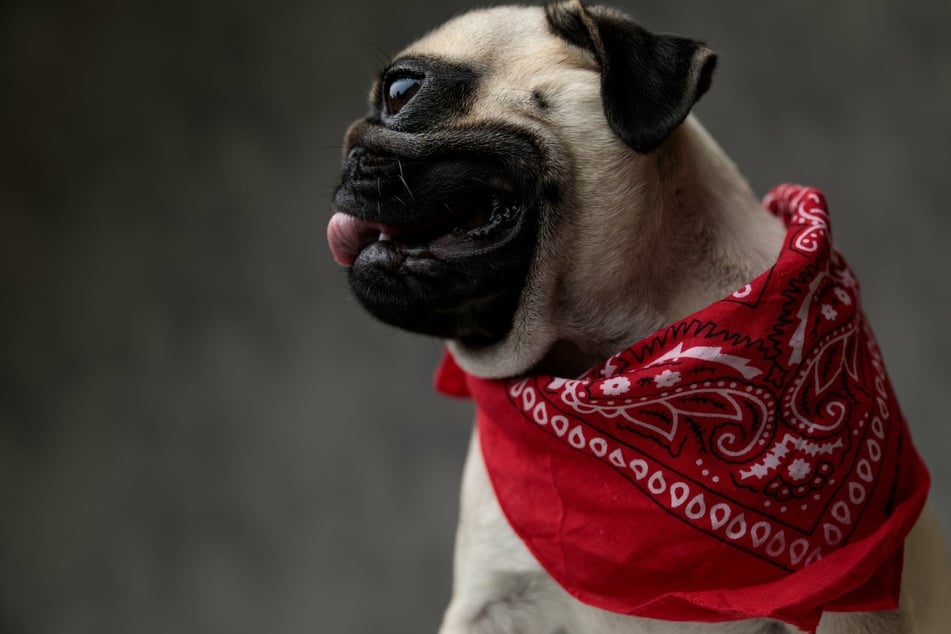
Reasons why dogs pant: To lower their temperature
Dogs don't sweat the same way as humans. Their bodies possess very few sweat glands, most of which are located on the bottom of their paws. As a result, our poor pooches have a difficult time lowering and regulating their body temperature and have to rely on other methods.
One such method is panting, which exchanges hot air from their lungs with the cooler air outside, causing water to evaporate quickly from their tongues, mouths, and noses. This evaporation helps to cool off the dog's body, effectively regulating and controlling their body temperature.
As a result, panting is actually a critical function in a dog's body, allowing them to reduce their temperature when it's hot, despite not sweating like humans.
Reasons why dogs pant: They are sick
If a dog continues to pant heavily even when resting (i.e. without prior physical activity or hot weather), we should make sure to pay attention to our pup. It is possible that this excessive panting is being caused by a disease or illness.
Some additional symptoms of panting-related illness include:
- Vomiting
- Fever
- Cough
- Listlessness
- Pale mucous membranes
- Continuous restlessness
- Excessive drinking of water
- Rapidly gaining weight
(Please remember that this list is not exhaustive and should not be considered as such.)
Various heart diseases, anemia, diabetes, infections, poisoning, allergies, and more can be behind a dog's excessive panting. As a result, if you notice that your dog's panting is being accompanied by other symptoms, you should take it to the veterinarian.
Reasons why dogs pant: Stressful situations
Dogs that are feeling stressed or anxious about something tend to pant, and usually other noticeable behavioral changes occur, such as trembling, whining, hiding, frequent licking of the lips, and restless pacing.
Triggers of stress or anxiety can include:
- Car rides
- Loneliness
- Fireworks
- Thunderstorms
- Children
- Visit to the vet
- Unfamiliar environment
- Other dogs
If you know the causes of frightening and stress-triggering circumstances for your dog, you should try to calm your pet down. Distractions with toys or a treat can also be quite helpful.
Reasons why dogs pant: They are in pain
Dogs are stoic fellows. As a result, it can be hard to recognize if your poor pooch is in pain. They hide it because they feel that showing weakness will make them a target. If they are panting excessively, though, take a look for symptoms of pain.
Severe panting can be accompanied by symptoms like whimpering, restlessness, a lack of appetite, increased sleepiness, and more. These signs are possibly caused by pain, and you should go immediately to the vet if you notice them.
Some possible dog-panting related causes of pain could be:
- Arthritis
- Bladder infection
- Ear infection
- Injuries
- Toothache
Good to know: If a pregnant dog starts panting more than normally, is restless and trembling, then this may indicate the onset of labor.
Reasons why dogs pant: Physical characteristics
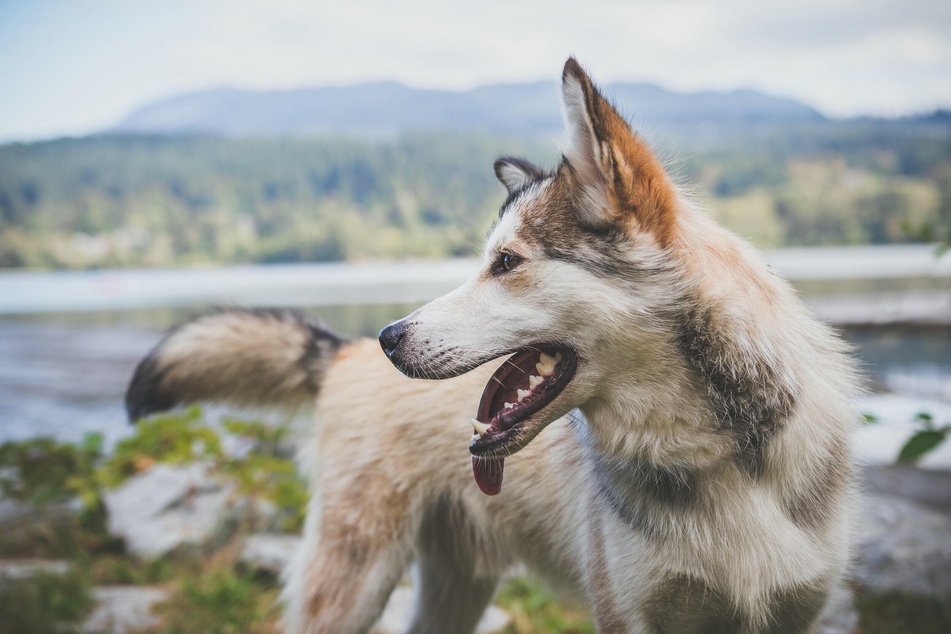
Certain breeds of dogs have trouble breathing due to their physical shape and characteristics. Those with a shortened skull, flat face, and a short nose, have particular problems.
The airways of such dogs are not particularly long, the evaporative surface on their nose is not large enough to effectively cool the dog down. As a result, these particular dogs will pant more than other dogs to help counteract overheating, despite their physical disadvantages.
A few dog breeds that have this problem include:
- Boston Terrier
- Boxer
- Chihuahua
- French Bulldog
- Maltese
- Pug
- Pekingese
- Shih-Tzu
- Miniature Pinscher
Smaller dogs who are "flat-faced" have problems with more than just cooling themselves down, but breathing in general. As a result, they should not be overly exerted.
How to calm a panting dog
Unless your dog is panting due to a medical reason, it is likely that the behavior being exhibited is due to the little dude being a bit too hot. As a result, the best way to help calm your panting dog is to simply help them reduce their temperature.
A few things you can do to help calm a panting dog include:
- Wet your dog with a hose, a watering can, or a bucket.
- Make sure that your dog is well hydrated, and get it to drink lots of water.
- If you are driving or are in a building that has air conditioning, turn it on and cool down the space.
- Keep your dog inside on hot days when possible.
If your dog is showing signs of anything more than simple overheating, or if it seems stressed or dehydrated, you must take it immediately to the vet.
My dog pants in the car, at night, all the time. Should I be worried?
Dogs pant a lot, but they're not supposed to pant all the time. They should have a resting breath rate, in the same way that they have a resting heart rate. If it seems like your beloved pooch is breathing too heavily, and too often, then you should get medical advice.
In general, dogs will pant heavily whenever they are hot or exhausted. If your four-legged friend pants even when resting, though, something else could be wrong. It's best to be careful - and go to the vet.
Cover photo: 123rf / Feedough

